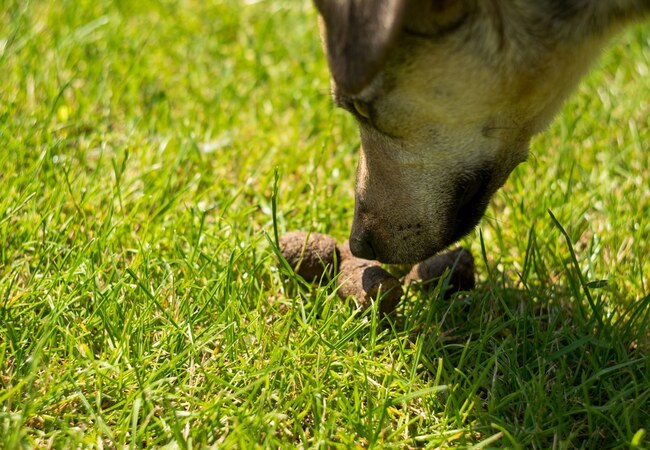Why Do Puppies Eat Poop in 2025 – Vet‑Approved Guide to Coprophagia Causes & Solutions 🐾💩

In this article
Why Do Puppies Eat Poop in 2025 – Vet‑Approved Guide to Coprophagia Causes & Solutions 🐾💩
By Dr. Duncan Houston BVSc
Witnessing your puppy eating poop (“coprophagia”) can be stomach‑turning—and worrying. But understanding why it's happening is the first step to managing it compassionately and effectively. In this 2025 guide, we’ll explore the healthy instincts, medical reasons, emotional triggers, and attention-seeking behaviors behind this quirky habit. You’ll also get vet-approved strategies to keep your pup clean, confident, and thriving. 🧠🐶
1. 🧬 Coprophagia: What Is It?
Coprophagia is the technical term for eating feces. It’s common in puppies and sometimes adult dogs. It can serve different roles, ranging from instinctual and medical, to emotional or simply learned behavior.
2. 🧠 Common Reasons Puppies Eat Poop
A. Instinct & Learning from Mom
Puppies mimic maternal behavior—mom dogs clean the nest by eating waste to keep it safe. Some pups copy this.
B. Digestive & Nutritional Gaps
If their food isn’t fully digested—due to diet, pancreatic issues, or parasites—puppies may re-ingest poop to reclaim nutrients.
C. Boredom, Anxiety & Attention Seeking
Puppies left to their own devices can turn to feces as play or stress coping. Reactions from owners—like shouting or chasing—can reinforce the behavior as attention‑seeking.
D. Medical Problems & Disease
New-onset or persistent coprophagia may signal deeper issues: malabsorption, pica, diabetes, thyroid disease, or CNS conditions.
3. ✅ When to Worry & See the Vet
- Sudden coprophagia in an adult dog without prior history
- Puppy also shows vomiting, diarrhea, weight loss, and lethargy
- Evidence of parasites, enzyme deficiencies, or hormonal disorders
A vet can perform fecal tests, check digestion, and assess for infections or metabolic imbalances.
4. 💡 Vet‑Approved Solutions for Coprophagia
A. Prevent Access Immediately
- Pick up poop right after elimination
- Restrict access to litter boxes or other pets' feces
- Use baby gates or elevated boxes to keep kitten waste out of reach
B. Train “Leave It” & Reward Clean Choices
- Teach cues like “Leave it” or “Come” using rewards and redirection
- After bathroom time, call puppy for treat—interrupts the sniff-eat-alert cycle
C. Improve Diet & Digestive Health
- Select a well-balanced, highly digestible food—especially for puppies
- Add probiotics or digestive enzymes if recommended by a vet
- Treat parasites and deworm regularly
D. Enrich Environment & Boost Engagement
- Increase playtime, walks, and interactive games—reduce boredom-induced behavior
- Provide chew toys, food puzzles, and scent activities to engage the mind
E. Use Safe Deterrent Additives
- Some products—like meat tenderizer, commercial deterrents—make poop taste unappealing, but results vary
- Always vet-approved before adding anything to food
5. 📝 Case Examples
“As a pup, Luna began eating others’ stools in our yard—likely scavenging. We redirected her with treats right after she pooped, boosted her exercise, and improved her diet—within two weeks, the behavior almost stopped.”
“Max, a 4-month-old husky, had loose stools and kept eating them. Vet found Giardia and digestive enzyme insufficiency. After treatment and special kibble, the coprophagia ceased.”
6. 📊 Quick Reference Table
| Cause | Key Signs | Approach |
|---|---|---|
| Instinctal | Puppy learning from mom/litter | Pick up early, gentle redirection |
| Digestive issues | Loose stools, weight loss | Vet check, diet + supplements |
| Boredom/stress | During playtime, alone periods | More enrichment + training |
| Attention seeking | Cessation of behavior when scolded | Ignore, redirect, reward calm |
7. 📱 Ask A Vet App 2025 Support
Get tailored help instantly:
- 📹 Upload video of poop-eating episodes for a vet or behaviorist evaluation
- 🛠️ Receive personalized cue training, dietary plans, and poop-management strategies
- 💬 Real-time consult access for persistent or sudden onset behaviors
8. ❤️ Final Thoughts
Coprophagia in puppies isn’t shameful—it’s a complex blend of instinct, growth-stage exploration, digestion, stress, or attention-seeking behavior. With consistent vet care, enriched environment, solid training, and quick prevention tactics, most puppies grow out of it by one year of age. In 2025, we handle it with informed, compassionate care—helping them learn better habits and thrive. 🐶💩
Need personalized support? Visit AskAVet.com or download the Ask A Vet app to receive expert guidance tailored to your pup’s needs.






